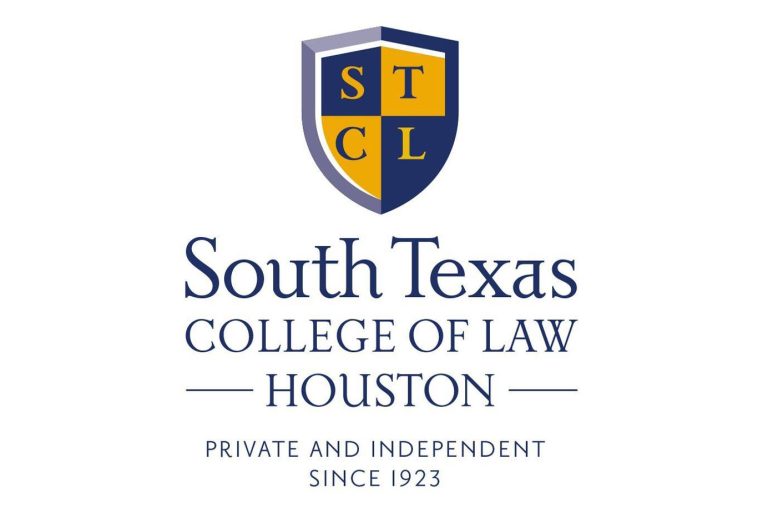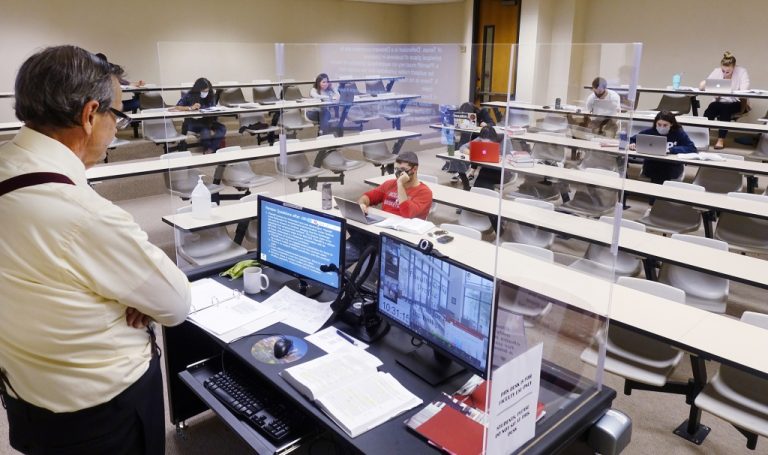 South Texas alumnae April Haynes Taylor ’17, chief executive officer at Opulent Transport, LLC, and Courtney Lynch ’17, associate with Kilpatrick Townsend & Stockton LLP, left a lasting legacy at the law school. As co-founders of the Women’s Law Society, they established a supportive organization for female law students that aimed to connect younger students with mentors and provide opportunities to network and establish lasting professional relationships. As part of STCL Houston’s celebration of Women’s History Month, they reflected on their motivations for starting the group and how it has influenced their careers.
South Texas alumnae April Haynes Taylor ’17, chief executive officer at Opulent Transport, LLC, and Courtney Lynch ’17, associate with Kilpatrick Townsend & Stockton LLP, left a lasting legacy at the law school. As co-founders of the Women’s Law Society, they established a supportive organization for female law students that aimed to connect younger students with mentors and provide opportunities to network and establish lasting professional relationships. As part of STCL Houston’s celebration of Women’s History Month, they reflected on their motivations for starting the group and how it has influenced their careers.
What inspired you to start the Women’s Law Society?
- Courtney Lynch: From our first day of law school, the school advised everyone to get involved with student organizations and to get to know other students, as those students would someday be our future colleagues. I ended up becoming an officer in the Real Estate & Construction Law Society, which was great. But by the end of my 1L year, April and I began to discuss the fact that there wasn’t an organization specific to women law students. As a mother who started law school at 31, I knew I benefited from connecting with other women, and April and I both saw a gap that could be filled.
- April Taylor: Yes, Courtney and I were both active in other groups on campus, as were the majority of our members. I was president of the Black Law Students Association (BLSA) but a women-focused organization was a topic of frequent discussion. I recall Courtney attending a construction law conference surrounded by a sea of men and pointing out what a problem this was.
- Lynch: April and I brought up the idea for the Women’s Law Society to the other women in our section and everyone was on board. From there we needed a faculty sponsor. We turned to Prof. Maxine Goodman, who was incredibly supportive, as was the STCL Houston administration. Because April was already serving as President of BLSA, I stepped into the role of president of WLS with April as Vice.
- Taylor: BLSA & AMICUS (the LGBT+ student organization) shared an office that had an additional empty desk, so WLS already had a spot before we were even really official!
Tell us more about the early days of this organization.
- Taylor: Courtney and I borrowed templates from other societies to create the constitution and bylaws. We worked on the logo and purchased promotional items like water bottles to hand out on campus. Courtney spent a lot of time promoting the organization, setting up our Facebook page, etc. To gain more exposure, WLS co-sponsored many events with BLSA and Construction Law, two other organizations we were heavily involved in.
- Lynch: We designed the group so the board would be composed mainly of 2Ls, with 3Ls providing guidance and mentorship, creating a continuous cycle of new leadership and participation in the organization. There was immediate interest in the group; it seemed to fill a need for female students. In the first year as an organization, the WLS won the President’s Award at the Barrister’s Ball, which was a big honor.
How many members were in the inaugural group?
- Lynch: I’d estimate the inaugural class had around 40 members with five or six officers.
- Taylor: We definitely exceeded the number required to start an organization on campus. I recall us roping in one of our close male classmates to join so that men who were interested in supporting women lawyers knew we were inclusive.
What benefits were there to being together with other women in this separate group vs. being in a different student organization?
- Taylor: Courtney and I were older than the majority of our classmates and had families. The responsibilities as wives and mothers posed a different set of challenges that WLS acknowledged and supported. This wasn’t a focus for other organizations.
- Lynch: Yes, I would echo that. At the time, I was still heavily involved in the Real Estate and Construction Law Society as vice president, and that organization did not have the explicit aim to support female students.
How do you feel knowing that the WLS is still strong and active today?
- Taylor: I am glad God placed on our hearts to contribute to STCL Houston, and am honored that current students have carried on the organization. Seeking out the rare female attorneys in certain law areas and connecting with them was a challenge, but we committed to the outreach to benefit our members’ careers through networking.
- Lynch: I am most proud of the effort we put into thinking about the longevity and structure of the organization. I’m very glad to see it’s still in place today, and I’m proud of the women law students who continue to step up and take on leadership roles in the organization. April and I were there for the beginning, but the WLS wouldn’t be the organization it is today without the continued leadership from each of the WLS board of officers since. I’m also glad the female 1Ls continue to have an official women’s organization for support for their very first day on campus, since we didn’t have that in our first year.Ultimately, our goal was to create a place where women could support one another, advocate for one another and build a community. I think we accomplished that
How did your STCL Houston education prepare you for your career?
- Taylor: As an entrepreneur, I deal with legal documents regularly, so my education definitely prepared me for that part of my role. STCL Houston also helped me to sharpen my problem-solving and critical thinking skills, which serve me well as a business owner.
- Lynch: My experiences at STCL Houston set me up for success as a legal professional. My career has drawn on the skills and contacts made through Law Review, the award-winning South Texas advocacy program, and the vibrant student life on campus (including, of course, the Women’s Law Society).
What are you proudest of as an alum of South Texas?
- Taylor: I truly cherish the extended family I acquired from being an STCL Houston grad. My classmates from Section B are still very close. We have a group text message that chimes regularly as we are still a part of one another’s lives.
- Lynch: I agree with April. You leave STCL Houston with a deep connection to your classmates. I am also continually proud of how many South Texas grads are in my professional community as colleagues and as clients.
About April Haynes Taylor
Taylor is CEO of Opulent Transport, LLC, a trucking company that she and her husband purchased in 2019. Opulent is an Amazon Freight Partner (AFP), operating a fleet of 23 Amazon-branded tractors as well as an additional nine tractors that run flatbed/drop and hook. The company was a featured AFP for one of Amazon’s Partner Summits, and Taylor has been featured in several trucking mediums such as The Trucker publication and Smart Hustle Podcast. She also owns a real estate brokerage, NextHome DA Assets, and actively works as a guardian ad litem for minors in personal injury cases.
About Courtney Lynch
Lynch is currently a construction litigator at Kilpatrick Townsend & Stockton, LLP in the firm’s Tier 1 National-ranked construction and infrastructure practice. She serves clients at all levels of a project and in all phases of construction, with a focus on risk avoidance and dispute resolution. She is also vice-chair of the Society of Construction Law North America and was recognized in 2022 as one of the “Best Lawyers: Ones to Watch” for Construction Law and Construction Litigation by The Best Lawyers in America®.



